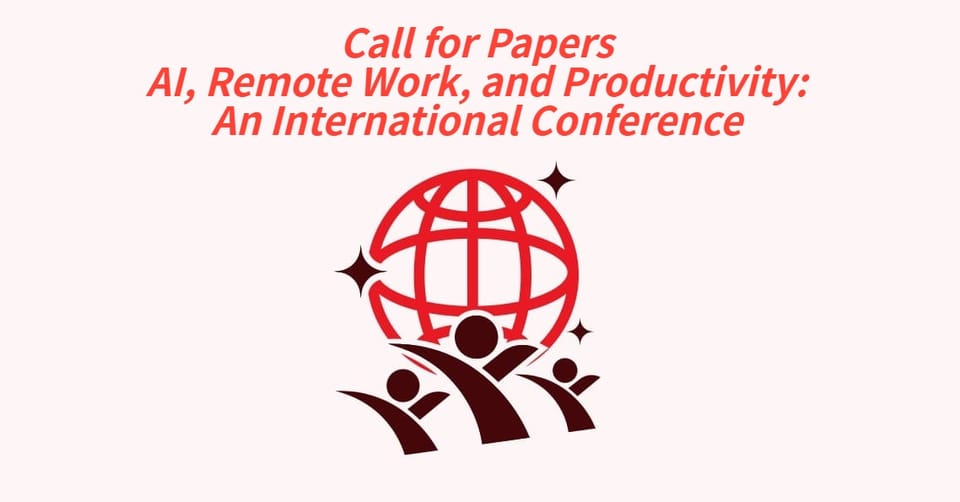Call for Papers——AI, Remote Work, and Productivity: An International Conference

Supported by the Productivity Network as funded by the SSHRC Partnership Grant, SSHRC PartnershipDevelopment Grant, the Bridge Divides Project as funded by the Canada First Research ExcellenceFund, Department of Economics at University of Alberta, Rutgers Centre for Global Work andEmployment, International Association for Work & Organization Studies, and Stephen JarislowskyChair, Faculty of Humanities & Social Sciences, Memorial University
Location: Memorial University of Newfoundland, St. John’s, NL, CanadaMay 8-9, 2025
The COVID-19 pandemic brought a “big shift” in the world of work. In the 2010s, the share of workdone from home in the United States was between 5% and 10% (Barrero et al., 2023; Mateyka et al.,2012). During the pandemic’s first full year, 2021, the United States Census Bureau (2024) estimatesthat 17.9% of workers in the country worked from home. The incidence of working from home hasstabilized at around 25% of all days worked in the United States, down significantly from its pandemicpeak of greater than 60%, but still five times greater than its pre-pandemic level (Bloom, 2024). Clearly,remote work is here to stay. The question is, what exactly are the impacts of working from home?
According to Bloom (2024), the average study finds that fully remote work decreased productivity by10%. However, some studies find positive effects while others point to even worse negative effects;research indicates a close to neutral impact for hybrid work. Remote work has heterogeneous uptakepotential and actual impact across different industries, jobs, organizations, and employees (Bloom et al.,2023; Hansen et al., 2023). Furthermore, the practice is still in its early stages of widespread adoption.As management practices, employee experiences, and enabling technologies all advance to better suithybrid or fully remote workplaces, longer-term outcomes will likely improve. Management concernsabout negative effects on communication, innovation, and culture may all be warranted, but the positiveoutcomes associated with working from home are likely not yet all uncovered. For example, remotework could reduce real-estate costs and commuting time, improve talent attraction and retention, andlead to better job matches in the labor market by widening the available labor pool across geographicalboundaries, and enhancing the representation of underrepresented groups (Hsu & Tambe, 2022).
As remote work was becoming institutionalized in the late stages of the pandemic, artificial intelligence(AI) was thrust into the public eye like never before. OpenAI released its ChatGPT chatbot to the publicin November 2022 to substantial media and online publicity. The chatbot displayed capabilities farbeyond any AI technology the general public had previously witnessed. Other tech firms accelerated thedevelopment of their AI technologies, and large firms in particular have substantially increased their AIinvestments. Early analyses predicted eventual productivity-boosting effects equal to trillions of dollarsto the global economy (McKinsey & Company, 2023), and approximately 80% of the United States workforce having at least 10% of their tasks being affected by exposure to large language model AI(Eloundou et al., 2023). At the time of writing, the economy is still very early into the adoption stage ofthese technologies. However, it appears that, so far, AI usage in the economy has been relatively limitedoutside of several big technology firms that are focused on research and development. The Economist(2024) recently argued that generative AI has had a minimal impact on productivity to date.
Evidently, remote work and AI both have interesting and controversial effects on productivity.Therefore, this call for proposals is seeking research related to the productivity effects of each.Successful proposals will be invited to present a paper at AI, Remote Work, and Productivity: AnInternational Conference, a conference to be held on May 8-9, 2025 at Memorial University ofNewfoundland located in St. John’s, Newfoundland and Labrador, Canada. Scholars from all relevantfields of study (Economics, Management, Sociology, Science and Engineering, Public Policy, etc.) arewelcome to submit proposals in line with the conference’s topics of interest. Remote work and AI aresubjects that span a multitude of disciplines, and the conference will recognize this reality. Please send aproposal relating to your research (maximum of 800 words) to Tony Fang (tfang@mun.ca) and Jane Zhu(zzhu@mun.ca). Questions or comments may also be directed to the same email addresses. Please sendyour proposal by April 1, 2025. Proposals concerning the following topics, and related subject matter,are welcome:
• Differences in remote work productivity pre-COVID, during the COVID-19 pandemic, and afterthe pandemic (i.e., remote work as exogenous shock or strategic choice).
• Determinants of remote work or AI’s adoption.
• Productivity effects of remote work or/and AI at the industry, organizational, work unit, orindividual levels.• Mediating and moderating factors in the remote work-productivity or AI-productivityrelationships.
• Research into the mechanisms through which remote work or AI can increase/decreaseproductivity at various levels.
• Research into management practices that can ameliorate productivity in remote or hybridworkplaces, or ameliorate productivity gains from AI adoption.
• Theoretical contributions that may help explain the heterogeneous productivity effects of remotework or AI.
• Comprehensive analyses of existing research into remote work or AI’s productivity effects (i.e.,meta-analyses or detailed state-of-the-art literature reviews).
• Qualitative or mixed-methods research into the mechanisms behind remote work’s/AI’sproductivity effects and the differences in opinion regarding them.
• Quantitative modeling or forecasting of remote work’s/AI’s productivity effects.
• Comparative studies that contrast remote work or AI productivity effects in differentgeographical or work settings.
• Productivity impacts of previous AI innovations.
• Synergies, or anti-synergies, between remote working and AI adoption.